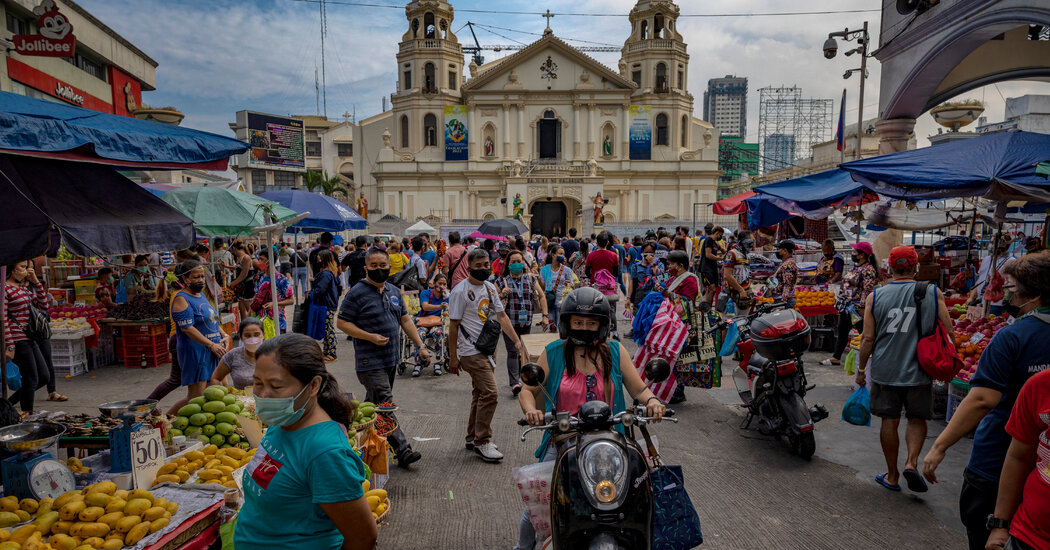
MANILA — In the Philippines, tens of thousands are crowding into political rallies in Manila, and the zoo there is packed. In India, millions fanned out last weekend to celebrate a Hindu festival. And in South Korea, 15,000 fans descended on a stadium in Seoul for three nights to see the K-pop band BTS perform for the first time since October 2019.
Many Asian-Pacific countries are dismantling thickets of Covid rules at bewildering speeds, even though the Omicron variant of the coronavirus is still raging in parts of the region. The moves are driven by a mix of medical advice, economic pressures and the sentiment of a pandemic-weary public that enough is enough.
“God knows we need this break,” said Shelly Bacallia, 29, who took her son to the Manila Zoo over the weekend, a reward of sorts for surviving a series of punishing Covid lockdowns. “We’ve been cooped up for the past two years.”
There is at least one major caveat to the trend: Mainland China, which has generally adhered to its “zero Covid” approach, sticking with the snap lockdowns and strict border controls it has employed since early 2020. The state-controlled media emphasizes that the country of 1.4 billion people has by far the best record of controlling the virus. It plays up the pandemic death and illness toll of other countries while pointing to China’s low numbers as a sign of the superiority of the country’s system.
But experts have questioned the wisdom of that approach as the country has grappled with its largest outbreak since the pandemic began in Wuhan, factories have suspended work and truck traffic has been delayed — snarling frayed supply chains.
“China’s zero-Covid policy will increasingly leave it — and Hong Kong, to the extent that it follows — isolated,” said Victor V. Ramraj, a law professor who edited a recent collection of articles about Covid-era legal policy in the region and teaches at the University of Victoria in Canada.
Hong Kong, a Chinese territory whose Covid policies once mirrored those on the mainland, diverged this week in its strategy, which has exacted a huge cost. With its previously tight border controls, the territory had cut itself off from the outside world, crushing an economy reliant on international trade.
On Monday, Hong Kong’s leader, Carrie Lam, announced a reversal of its ban on flights from nine countries and signaled plans to further relax Covid rules. But the changes came even as the territory was experiencing a huge outbreak, with the city’s Covid fatality rate currently among the world’s highest, at three per 100,000 residents. Bodies are piling up next to Covid patients in hospitals and mortuaries are filling up quickly.
But almost everywhere else in Asia, virus rules have been in steady retreat, the pace dictated by epidemiology, economic imperatives or political pressures.
In India, where enormous Covid outbreaks once killed hundreds of thousands, restrictions there have largely vanished in recent weeks, except for a requirement to wear masks. Last weekend, millions of people celebrated Holi, a Hindu springtime festival in which people throw colored powder at one another.
S. Sivaraman, 68, an advertising executive in the capital, New Delhi, went to a Holi party in a park with his family and about 100 neighbors. As people ran around dousing one another with powder, he said, the traumas of the pandemic were briefly forgotten.
“We felt so happy to be out of a cage,” he said, “meeting people freely and hugging each other.”
Thailand has been gradually relaxing entry requirements for foreign tourists in recent months. In Indonesia, Bali — an essential driver of the country’s tourism sector — has reopened at a faster pace than the rest of the country; it was among the first provinces to drop quarantine for foreign travelers.
There is some concern that Indonesia’s central government could put in place new restrictions in Bali during the Ramadan holiday that begins in April. But Theresia Elena, the general manager of the Dash Hotel Seminyak on Bali, said she wasn’t worried.
“That won’t happen,” she said. “This is Bali. We’ve been given sweet promises.”
New Zealand’s initial caution toward the virus became politically untenable this year, after business groups called for fewer restrictions and citizens living overseas protested limits on their return. Starting April 4, vaccine passes will no longer be required to enter public facilities and vaccine mandates will be dropped for education, health, police and defense workers, Prime Minister Jacinda Ardern said Wednesday.
The South Korean government said this month that it would relax several antivirus measures under similar pressure from businesses. The departing president, Moon Jae-in, eased the rules in the midst of an election campaign in which the governing party’s candidate had been trying to court votes from long-suffering small-business owners with pledges to unwind pandemic rules, including nightly curfews and limits on the number of people allowed to gather publicly.
Jacob Lee, an infectious-disease specialist at Hallym University in South Korea, criticized the change, saying that it had been, above all, “clearly a political decision.”
“Scaling up social distancing would have been the correct and scientific thing to do,” he said. “But South Korea took the nonsensical step of preemptively easing distancing.”
The Latest on China: Key Things to Know
Japan, which has maintained some of the tightest entry barriers, is also considering removing quarantine requirements for foreign businesspeople and students. More Southeast Asian countries are admitting tourists, including Cambodia and Vietnam, though travelers have been frustrated with unclear guidelines on quarantines and testing.
In the Philippines, Covid protocols have taken a back seat during campaign rallies for the presidential election in May. Tens of thousands of people crowded into Manila’s Ortigas business district last weekend to see Leni Robredo, who is running to replace the departing president, Rodrigo Duterte. It was the largest public gathering in the country in two years.
At the same time, masks are still required in public places, some schools are still holding classes online, and reminders about social distancing are still plastered around venues.
That includes the Manila Zoo, where Ms. Bacallia’s 7-year-old son received a second dose of a Covid vaccine at a pop-up clinic last weekend as a condition for entry. He is scared of needles and put up a fight.
“But it is good that we can all go out now,” she said. “We told him, ‘We’re going to the zoo, but you need your shot first before you can get in.’ That helped to calm him down.”
The question now is how long China can hold onto its zero-Covid policy.
This month, officials imposed stringent restrictions on residents’ movement in two major cities, Shanghai and Shenzhen, on a day when each megacity reported fewer than 70 new cases.
But there are signs that even China is tweaking its approach, after the country’s leader, Xi Jinping, urged officials to limit the economic pain of the country’s Covid response.
Still, the virus controls retain the support of many.
Ryan Liu, 33, who works at an internet company in Shenzhen and has barely left home this month, said he was happy to make a sacrifice for the greater good.
“In our view, or in the view of most of us, we prefer this kind of strict control measures,” he said. “We must take some measures, and we can’t let it go.”
Jason Gutierrez reported from Manila, and Mike Ives and Victoria Kim from Seoul. Reporting was contributed by Hari Kumar in New Delhi, Keith Bradsher in Beijing, Muktita Suhartono in Jakarta, Indonesia, and Amy Qin and Amy Chang Chien in Taipei, Taiwan. Li You contributed research.




